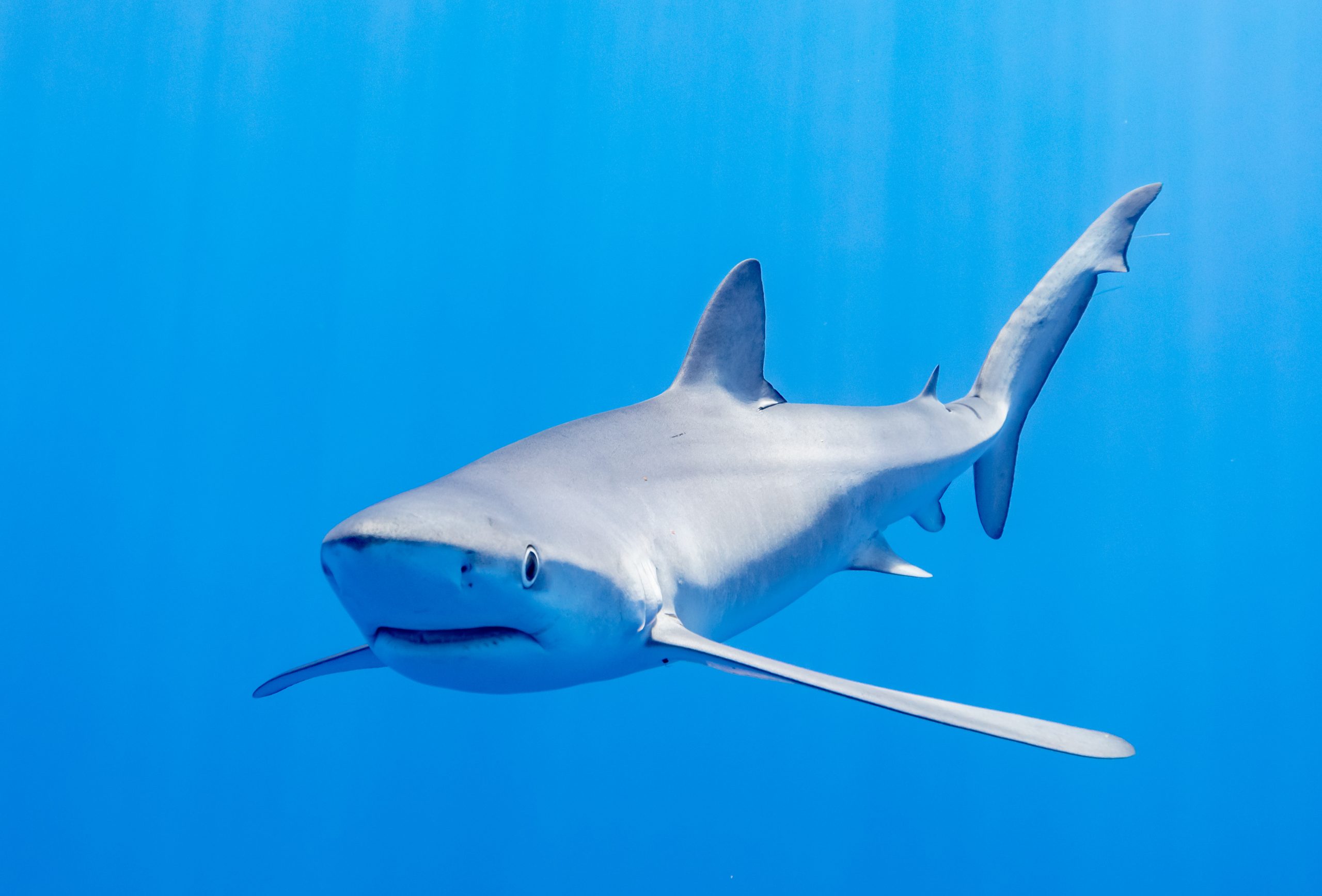April 15, 2025

Sharks, rays, and chimaeras (Chondrichthyes) are among the most threatened groups of marine animals, with 37.5% of known species currently at risk of extinction. Their unique biology makes them highly vulnerable to overfishing, and many of them are caught as a bycatch in tuna fisheries, but some species, like blue sharks, are targeted by important commercial fisheries. Blue sharks are fished in the Atlantic, Indian, and Pacific Oceans by both industrial and artisanal fisheries. Therefore, effective management procedures (MPs), also known as harvest strategies, should be developed and implemented to ensure their long-term sustainability. Sharks should be managed with the same rigor as other commercially important species, such as tuna and swordfish.
Oceanic sharks are regularly caught by tuna fisheries, which catch sharks alongside tuna species. These fisheries operate within the jurisdiction of the four major tuna regional fisheries management organizations (RFMOs): ICCAT (Atlantic), IATTC and WCPFC (Pacific), and IOTC (Indian Ocean).
Blue sharks are the most commonly landed shark species across all four RFMOs. Annual reported landings exceed 180,000 tonnes globally, with an estimated ex-vessel value of more than USD 400 million. Despite their commercial importance, blue sharks — like many other shark species — have historically been lacking the same type of management as applied for tunas or billfishes and are often overlooked despite their commercial and ecological significance. Comprehensive MPs could play a crucial role in safeguarding their future.
Progress on shark management has been limited, often in part due to their designation as “bycatch.” However, this is changing. The statutes of WCPFC include highly migratory species such as sharks, and ICCAT and IATTC have taken steps to include shark species more explicitly within their management frameworks. Notably, IOTC’s Resolution 2018/02 laid out a path for developing harvest control rules for blue sharks, although implementation has lagged.
There is now growing momentum to change this.
ICCAT Leads the Way on Blue Shark Management
In recent years, ICCAT has made notable progress in blue shark management. In 2019, the Commission adopted preliminary total allowable catches (TACs) for North and South Atlantic stocks, which were revised and allocated in 2023 following updated stock assessments. The 2023 measures also called for a feasibility study on MP development for the two stocks. Some preliminary management strategy evaluation (MSE) work on the North Atlantic stock was presented at ICCAT science meetings in 2024, demonstrating that MSE is technically “feasible” for blue sharks.
At the 2024 Annual Meeting, ICCAT added both stocks to its MSE workplan, endeavoring to complete MSE development and adopt MPs for both North and South Atlantic blue sharks in 2027.
IOTC Starts to Move Forward
In the Indian Ocean, implementation of IOTC Resolution 2018/02, which called for the agreement of target and limit reference points stalled after the 2021 blue shark stock assessment. That assessment found that the stock was not overfished nor subject to overfishing but warned that an increase in catches could change this.
Recent developments at IOTC show promise. In 2023 and 2024, the Maldives proposed a comprehensive shark conservation and management measure — co-sponsored by Pakistan and supported by many other members — that included a TAC for blue sharks, gear modifications, improved reporting, and a proposed MSE process. While the proposal was not adopted, the Commission requested that its scientific bodies initiate MSE for blue sharks in 2025.
Looking Ahead
These steps mark a long-awaited shift toward more science-based, proactive shark management in both the Atlantic and Indian Oceans. With ICCAT already underway and IOTC initiating an MSE process, the groundwork is being laid for robust management procedures for blue sharks — ones that can help ensure the long-term sustainability of this commercially important species. Pacific RFMOs should take similar steps.
At next week’s IOTC Commission meeting in La Réunion, members will have another opportunity to support this work. The proposals tabled by the Maldives, Pakistan, and South Africa — and echoed in Japan’s proposal — recommend adopting a TAC for blue sharks by 2026 and establishing reference points as part of a modernized approach to shark management. While only the Maldives’ proposal explicitly mentions starting an MSE process for blue sharks in IOTC’s MSE workplan, providing the necessary funding is critical for moving this forward
Effective, sustainable management of blue sharks — and other oceanic sharks — is achievable. With continued leadership and support from member states, the next few years could mark a turning point in ensuring that these ecologically and economically important species are sustainably managed for future generations.
About the Author: Iris Ziegler holds a PhD in pharmaceutical sciences and an MBA and is a passionate shark conservationist who strongly believes that a global transition to truly sustainable, ecosystem-based fishing operations is key to marine conservation and to turning the tide for sharks.
After having worked in the pharmaceutical industry for 30 years she joined Sharkproject in 2015 and started building up Sharkproject’s engagement in fisheries policies which she headed between 2017 and 2024. As an accredited observer at IOTC and ICCAT she has been advocating for strengthened conservation and management measures for shortfin mako sharks, blue sharks and bycatch reduction in tuna fisheries.
Since June 2024, she has been heading the fisheries policy and ocean advocacy work of the Deutsche Stiftung Meresschutz (DSM). She continues the international RFMO work but also works on European Marine topics like the EU deep sea access regulation and its implementation.
She is a member of the Steering Committee of the Make Stewardship Count Coalition, an international coalition of more than 90 NGOs and marine scientists advocating for improvements in the MSC Standard, with a focus on Principle 2, Ecosystem and Bycatch.
She is a member of the Long Distance Advisory Board to the European Union, where she represents Seas at Risk in the Advisory Board as part of the Executive Committee.